Stargate SG-1 Season One–Making Weak Ideas Into a Better Story
The series Stargate SG-1 was new back in 1997, so you’d think I would have watched it back then. I didn’t, mostly because the series stemmed from a 1994 movie that didn’t appeal to me very much. The movie saddled the series with some weak story ideas (yes, in my opinion) that I’m going to detail in this article in just a bit. But as I gave the series a chance (yes, watching it on Netflix), it grew on me. The arc of the story made good use of the material it had, improving through the twenty-one episodes of the first season. To use a card playing analogy, the series was dealt a bad hand which it played well.
Note that Stargate SG-1 lasted ten seasons and spawned multiple sequels, especially Stargate Atlantis, which lasted five seasons. I’m not vouching for any of the other seasons beyond the first and the episodes I’ve seen in the second season and of course I’m not commenting on Atlantis. TV series sometimes find a fanbase devoted enough to keep cranking out episodes even if their content isn’t very good and I think that it’s at least possible that happened to Stargate SG-1 as it went on. But I looked on some fan forums and the consensus seems to be that season one is not Stargate SG-1 at its best. We’ll see if I agree with that as I continue watching.
No doubt a forum like this directed towards fans of speculative fiction will include some die-hard Stargate SG-1 loyalists, who might object to me saying the ideas behind Stargate were weak. I’m not trying to be offensive–certainly the things that bother me don’t always concern other people, which is fine. I’m not saying you don’t have the right to like what you like, but that for me, the basic ideas behind Stargate SG-1 were faulty.
This post will contain some mild spoilers, by the way. But I won’t give away any plots in detail.
Weak Ideas in Setting and Character From the Movie
Ancient aliens
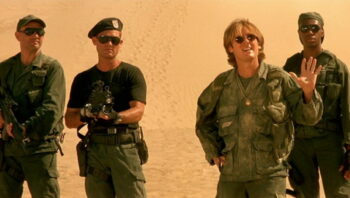
The US military crew in the Stargate movie. Image copyright: MGM
For the uninitiated, the movie Stargate stemmed from the idea that the Egyptian gods were in fact real. They were aliens who visited Earth in ancient times and enslaved humans. They came to Earth through a gate that through a series of codes connects to other inhabited worlds, using wormholes. The US military, the US Air Force in particular, get its hands on a gate that had been buried and contacts a brilliant but controversial linguist who cracks the code of the gate and travels to a world that looks pretty much like ancient Egypt, where a battle between modern men and ancient “gods” takes place. Humans kill the “god” Ra and save the planet.
The whole finding an ancient stargate by the US military thing I would say is a strength of the Stargate SG-1 series. It’s an intriguing notion to think of modern military having access to other star systems and having a motivation to explore them directly related to the defense of Planet Earth.
But the Stargate movie set this up with aliens having pyramid-shaped spaceships and wearing costumes with serpent heads, to which my gut reaction was they look ridiculous. The ancient aliens have a number of characteristics that annoy me, beyond their appearance:
- I think the very idea of ancient aliens in Egypt covertly supports the idea that aliens were behind all ancient beliefs in gods and goddesses, including the belief in the God of the Bible. Which I don’t agree with, of course.
- The ancient aliens have plasma weapons we are supposed to believe are superior to guns, but which shoot slower and miss plenty–it fact in some scenes they miss much more than they hit. The aliens seem kinda weak, actually, but the story maintained the fiction they are strong “because.”
- The fact the Goa’uld (the name for the Egyptian-esque aliens) speak ancient Egyptian is what gives the brilliant linguist character (named Dr. Daniel Jackson, in the movie played by James Spader) access to them. But it messes with ancient Egyptian history and linguistics. Ancient Egyptian isn’t a language isolate–it’s related to lots of other languages, including Hebrew, and it’s just weird to me that this is supposed to be an alien language.
- The ancient aliens are into enslaving humans not for the obvious purpose of building their pyramids, which are actually highly technological, but for “just because” reasons. Which messed with my logical brain, “Wait a minute, all the alien’s tech is something the human slaves can’t build–what exactly are the human slaves for in the first place?” (Hosting hostile aliens, sure, but you don’t need hordes of slaves for that.)
- Religion is a tool for the aliens to subjugate their slaves. So Ra isn’t a god but has himself worshipped as a god because it helps him run his slave empire. Yeah, while this could be adapted to say this kind of religion only applies to false gods as opposed to Jehovah the Creator of all, I think the idea takes a shot at all religion, actually.
Getting the U.S. Military Wrong
So one of the key figures in this story is a US Air Force colonel, Colonel Jack O’Neil (portrayed by Kurt Russell in the movie)…who is a veteran of special forces, a lead from the front kind of guy…and wait is in the Air Force? And is a full bird colonel? (“Full bird” means not a lieutenant colonel–he wears an eagle for his rank, not a silver oak leaf.)
People know, right, that the United States Air Force, while a great institution in many ways, doesn’t have a lot in the way of special forces? They have two basic special forces jobs, one with their guys embedded in another kind of unit (Army, Navy, or Marines) in order to control attack aircraft. The other job is pararescue–parachuting back behind enemy lines to rescue US forces, especially downed pilots. Neither of those jobs are like what Col. O’Neil is supposed to have done.
And how many colonels lead from the front? Not many. Not that it couldn’t happen, but where are all the enlisted guys, the sergeants and other non-commissioned officers? Stargate has a bit of obsession with officer ranks. Too many characters who would not be officers in reality are officers in the Stargate franchise.
Also, I’ve known a number of special forces guys–not a huge number but some. And I’ve known a number of colonels. I haven’t met any real person who is a hard-charging-wise-cracking-fighter-who-is-disinterested-in-academic-details who is actually a colonel. I’m not saying such a person is impossible, sure I suppose there have been historic people like that–but the character strikes me as what someone would imagine the US military is like rather than what it is like. The US Air Force in particular is pretty brainy! (Though in fact, some fighter pilots are a bit like Col. O’Neil, but that’s a whole other can of worms to talk about why fighter pilots are not like other officers…)
Problems Stargate SG-1 Added to the Movie
Frontal Nudity
In 1997, Stargate SG-1 aired on the Showtime network. The first episode contains a scene that shows full female frontal nudity. It was not necessary to the story–she could have kept her clothes on. I skipped past the scene when it came up–but in fact I could have skipped past the entire episode. The first episode in effect re-introduces the stargate and introduces the main characters. The only parts really important to the series is that the alien Goa’uld remain a threat, though now through Apophis rather than Ra. And, a human-like but non-human servant of the Goa’uld rebels against them and decides to help the humans on their quest to explore other worlds through the stargate, the main character Teal’c.
Note the first season doesn’t do nudity again and eventually the series left Showtime. In fact, doing a bit of research, it appears the first episode is the only episode in the entire franchise to feature full nudity. If you haven’t seen this series but are interested but want to avoid the gratuitous nudity, just skip the first episode altogether. You will realize quickly enough who Teal’c and Apophis are, without that episode–other episodes cover the essential bits.
English-Speaking Aliens
Most science fiction series have believed its impractical to feature aliens speaking alien languages for more than short bits. Star Trek dealt with this by imagining there was such a thing as a “universal translator” that quickly and easily picked up alien words and translated them–with Star Trek only delving into language translation when it decided it wanted to do so.
So it’s understandable that aliens or ancient humans long ago removed from Earth would speak English. Practically, the producers of the show made that choice for reasons I get. But it creates a problem. You see, the purpose for Dr. Daniel Jackson stemmed from his abilities as a linguist. He cracked the stargate code and could communicate with the Goa’uld based on speaking their language…and the Goa’uld still speak some reconstructed ancient Egyptian to be sure, though they also speak English. But if not as a linguist, what purpose does Dr. Jackson serve?
The first season has him morph into a bit of a cultural expert and keeping him on makes sense–but the decision to eliminate foreign languages gives him less to do and at times brings up the question, “Ok, why don’t they replace this guy with someone from the military?”
Alien Worlds Look Too Much Like British Colombia
Stargate SG-1 was filmed in Canada, around Vancouver in British Colombia. Aaand, a lot of alien worlds in the first season happen to look just like the forests of B.C. Though in fact I found the producers did a bit less of that as the series went on. Still, while the issue is as understandable as using the English language–you film in the locations you have easy access to most often–one of the things about a stargate system is that it would go to all kinds of worlds, including very exotic ones. So it’s a mistake to show too many worlds looking essentially alike.
Too Much Repeating Ancient Cultures
Some people might think it’s awesome that you find ancient Mycenean culture (and other examples) reproduced around another star because people were lifted from there long ago. But the fact they never changed seems odd–though of course they did manage to learn English (ahem). But visiting ancient cultures over and over, even though I love history, wasn’t something to float a series on. I think season one went this direction for a while because of Dr. Jackson’s expertise in ancient cultures…and he needs something to do on the team, right? Fortunately Stargate didn’t stick with doing that only.
Cheesy?
Stargate SG-1 goes for a sincere approach to subjects, other than the wisecracking Col. O’Neil, who does provide needed comic relief at times. With special effects not always being the best and some particular story plots a bit weak, sometimes this series verges on campy, especially when the Goa’uld show up in serpent costumes. Or with certain other aliens. But I think the series overcomes this issue and in many ways makes the best of what it has.
How Stargate SG-1 Made the Best of What it Had
More Realistic US Military
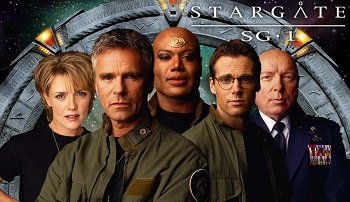
The main cast of Stargate SG-1. Image copyright: MGM
The fictional stargate program is headed up by an Air Force commander, Major General Hammond. The character Hammond looks, talks, and acts like a general in my opinion, with only a few deviations. He talks about national defense, duty, and is willing to sacrifice people for the mission, but always cares about his people. And not just him, many other lesser military personnel seemed quite true to life. I in particular like the detail that Stargate SG-1 is just one stargate team out of many–it’s not like the military to have just one team for something like this.
I found Hammond and other changes in the military for the series convincing–and it’s important the military seem convincing. After all, that’s the good part of the basic premise of this story–what if the US military (Air Force specifically) had access to alien worlds, in a quest to prevent our planet from being invaded, seeking allies against dangerous aliens–the Goa’uld.
Loved the Alerts
Since the stargate can be a means for enemies to attack the human race, a number of defensive systems get installed around it. The fact an alarm goes off when the stargate has an unauthorized activation or when there’s an unknown incoming connection, the fact they have an iris defensive system and drop blast doors and have armed teams at the gate with weapons every single time this happens plays up the idea that the Planet Earth really is at risk, no kidding, and this time the United States military isn’t necessarily anywhere close to the toughest fighter around. Nobody knows what’s coming through the gate–that premise built dramatic tension and the writers played this card well.
Expanding the Threat
One of the obvious logical issues concerning any threat a stargate could have to Planet Earth would be, “Why don’t you just bury the thing or destroy it?” But by making it clear the Goa’uld also have starships that can directly attack Earth, the stakes were raised. It’s not if Earth will be invaded, but when, so the question of finding allies or useful technologies is vitally important. Honorable mention goes to a realistic evaluation of how incapable our planet would be in fighting off attackers from outer space…even goofy goobers like the Goa’uld.
Pentagon Politics
Not only are the threats from alien invaders raised, threats from inner-Pentagon politics arise as well. Intelligence officers and agencies with their own agendas, cost-cutting politicians, and military rivalries pop up appropriately in Stargate SG-1’s first season.
Likeable Characters
While one of my objections to the set-up for Stargate SG-1 is the Colonel O’Neil doesn’t seem real, the character is likeable, increasingly so as the first season progressed. Teal’c is also very likeable, as is Capt. Samantha Carter (an Air Force astrophysicist who is also a member of the team). Dr. Jackson I may like the least, but his character is still an empathetic figure.
Consequences
The series so far doesn’t ignore consequences from past actions. Aliens met once might be seen again. Characters encountered once can pop up again–with memories of the last time they met. Most importantly, the series deals with what it would be like to actually connect to alien worlds. The issue of plagues and diseases arises, for example. Via an alternate reality themed episode, the series shows that things could have been very much worse for humanity via combat through the stargate than it actually was–which is good. The series takes seriously the idea that there could be negative effects from running headlong into unknown worlds.
Morality
The series doesn’t hestitate to see enslavement as a bad thing–there’s no hint that “Maybe that’s okay for an alien culture.” Stargate adopts a general morality of the value of loyalty and self-sacrifice, the importance of fighting oppressors and being alert when evil comes attacking. The conscience that God put in human beings in general is reflected in these values. In fact, the morality of loyalty to one another is part of what makes the cast likeable, though that’s true for ensemble casts in general.
God missing?
So I’ve gone through the arc of talking about problems in the backstory of Stargate and how I think the series managed to produce a number of genuinely interesting stories in spite of what strikes me as a weak set up. One issue deserves re-visiting. The issue of God. Yes, the idea that all gods are aliens I already mentioned can (can, not must) imply that the same is true for the God of ancient Israel and Christianity. Yeah, that is what it is, but there’s another issue related to God.
So in the modern United States military, including the Air Force, are there any people who pray? Any chaplains? Any religious support or religious sentiments? Yes, of course there are. Does anyone pray in Stargate SG-1? Nope.
General Hammond I think on occasion says things like “we’d better hope to God that doesn’t happen” but the only reference to God other than that is a cost-cutting senator who expresses the opinion that the stargate is not needed because God will protect Earth (which actually is an argument for not having any military at all…) The senator is clearly shown to be in the wrong. So the series in effect tries to make an interesting story–while trying to ignore the issue of God…leaving the primary mention of God’s role in the universe belong to someone who is sanctimoniously wrong. FYI.
It would be interesting to have a story like this with a religious aspect included…but it is what it is.
Conclusion
I was a bit surprised in searching the Speculative Faith site to discover nobody has written an article about Stargate SG-1 previously. I’m curious why that would be. In any case, are there any fans of Stargate among us? Any who hate it? What are your opinions of the Stargate movie and Stargate SG-1 series? Please make your thoughts known in the comments below.

































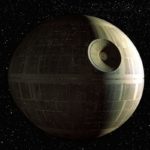
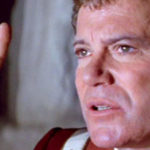
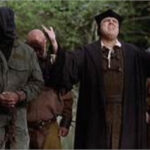



I love Stargate, far more than Trek or Wars, partly for some of the reasons you list. Characters you come to live. Consequences. Continuity. (Some of those “throwaway” episodes from season one matter immensely later on.). I’m currently on season 9 with my third child after watching them all with my wife when they came out, and then with each of my other kids. So this is at least the fourth time through.
A note on that stupid nude scene: Showtime demanded it, and the creators knew it was stupid and pointless and said so in dozens of interviews. Years later, they released a remastered version of the pilot episode, Children of the Gods, as a stand-alone movie, in which they cut that scene out.
Tim, thanks for your input.
I don’t yet love Stargate but maybe I will as I continue watching. But I started with a low opinion that shot upwards as I continued watching.
Yeah I can totally see Showtime insisting on a nude scene over objections. Thank God they were not able to manage to get the series creators to repeat that unexpected bit of awful…
Yeah, over time I’ve learned that even though it’s good to have cool new ideas, it’s often the execution that matters more, especially in stories. And then I think a lot of us have favorite story elements and tropes we like seeing used over and over (so long as they’re done right) even though they’re obviously not original anymore.
I don’t think I’d bother to watch Stargate, at least not by myself. Maybe if I was with friends and they decided it was what they wanted to see. IDK, some shows don’t interest me in and of themselves, but can still be fun to see with other people to get their reaction to those particular shows.
Yeah of course execution matters but some of my favorite science fiction stories have what I consider a good idea at its core–and Stargate is in that category in part. The ancient Egypt thing I’m not so on board with (for me, it’s often cheesy, at least so far), but that the US Military found a way to travel to other stars in an archeological dig and needs to use it in spite of risks or we will all be crushed by powerful aliens? That’s a good story idea.
As for Stargate SG-1, I was only at best mildly interested. But actually watching it raised my opinion.
Thanks for commenting!
I became a strong fan of Stargate series. I liked the movie, mostly the premise. I really liked Daniel. “Once you get the vowels figured out” was his strong point. In the series he became head researcher of ancient cultures and translator of written information. Translating Goa’uld and then the higher level ancient’s writing was a big part of his job.
My take on the lack of faith is, for good or bad, mostly bad; the military has downplayed the services of chaplains to the point congress tries to get rid of the chaplains corps every now and then. The only thing that keeps them is their charter stating soldiers must have access to their faith during service, a constitutional first amendment right. I’ve met a number of chaplains. Some I considered less than shining examples of spiritual leaders. I don’t know if that had to do with an anti-faith atmosphere and some rules against doing what shepherds of the faith do, or what.
Finding the true god was never part of the show, but one wishes it had been. Tealc’s faith in the Goa’uld was broken as was his mentors when they recognized they were dealing with false gods. They reacted dramatically, which seemed to be the writer’s secondary theme; killing false gods. To do that, one must have some yard stick to know what a true God is. Inner understanding with no explanation was the way the writers did it.
If the show dealt with true faith at all, it was showing characters walking the walk, if not the talk. There was a strong sense of morality in the show, which you mentioned. Right and wrong were not metaphysical notions or questions. When they were treated as such, it was a sign of a false god or enemies at work.
Thanks for your thoughtful comments. In general, I think think turning away from false gods without turning to the true God isn’t realistic. It puts materialism in the driver’s seat, which winds up being its own kind of god…
True,
I have my own write-up about God and dealing with a multi-sentient universe with eerily similar written text about the one God to the point multiple world religions agreed to not to split hairs and to each his own book.
The joy of SG-1 is not the stories or the world building. It’s the characters and their devotion to each other. That’s why only reviewing season 1 doesn’t capture the true strengths. For instance, Carter is the greatest female role model of all time. The last few seasons were a bit labored, but I’ve watched all 10 seasins twice.
Your comment makes me curious as to why you see Carter as the greatest female role model of all time. She’s a solid character in season one, to be sure. But with some people drawn to say, Wonder Woman as a role model or Ripley from the Alien franchise or Captain Janeway from Star Trek, what makes Carter greater than any of those other figures?
I think Janeway was unfortunately jerked around by writers who couldn’t make up their minds on how to handle her character, but on the other hand, if Amanda Tapping was less charismatic, Carter would probably have been in danger of just being a one-note set piece used to make the plot go boom, with action-girl-flavored sprinkles.
It was one of my comfy trash-watching shows that I can crochet while watching/listening. It definitely suffers a lot of campy TV pitfalls, but then Teal’c raises his eyebrow and says “Indeed” and I forgive it.
Once upon a time I owned the DVD set for all 10 seasons, but I got rid of it sometime after college, when I moved around a lot, because it was giant and heavy. It’s been long enough that I’m enjoying watching choice episodes but skipping the lamer ones (like Hathor, ugh what a waste).
Well said!
I’ve watched all of SG-1, and the first couple seasons of Atlantis. I enjoyed it all. I will say, though, that in the later seasons, there’s a different foe that seems a bit more similar to Christianity. I’m still not quite sure about that, and whether it was purposely putting Christianity in a bad light, or showing how something like Christianity could go wrong without such vital elements as forgiveness.
I will say, though, that the whole theme of the show is one of freeing oneself from false gods and taking ones place among the stars. Later on, they learn of other ancient races, who were all very powerful. But I think there is a very, very slight message of “We are in control of our own destiny, no god rules over us.” Which similarly, I don’t agree with. But it doesn’t come up too terribly often, and I can still enjoy the show.
I did once consider writing a bit of fanfiction where the main character is a chaplain attached to the SGC. I didn’t take it very far, though, and honestly, I think it would come off as a bit too preachy. It might be better for the main character to be a common soldier, who then goes to the chaplain for advice. Say, actually, that’s a much better idea…
Yeah, I do think there is a vibe of “we don’t need to worship nobody” in Stargate. Which actually is pretty similar to certain episodes of Star Trek.
It would be interesting to write fanfiction of another stargate team, say SG-7, which featured some Christians on the team, who, without being preachy, simply reacted naturally to what was going on. And yeah, we never hear about him, but there has to be a chaplain at the SGC, who would very realistically play a role in the lives of at least some of the people assigned there.
I really like stargate and sg1. Daniel my fave. but stargate seems like its mocking Christianity with the ori and adria. is it?